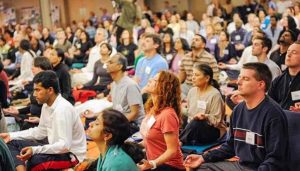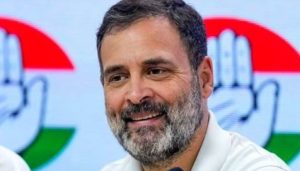2-Day States Workshop on Scaling Up Swachh Bharat Mission (Gramin) organized in Udaipur

The Secretary, Ministry of Drinking Water and Sanitation, Shri Parameswaran Iyer addressing a workshop on Swachh Bharat Mission, in Udaipur, Rajasthan, on April 09, 2016.
“Swachh Bharat by 2019 is doable, and we will achieve it”, was the chorus that emerged out of the two day deliberations that happened amongst the senior most level of officials from all the States and Government of India at a Swachh Bharat Mission workshop organized by Ministry of Drinking Water and Sanitation on the 8th and 9th April, 2016, at Udaipur. The workshop brought together Secretaries, Principal Secretaries, Mission Directors, ‘champion’ Collectors, and development partners working on the Swachh Bharat Mission, on one platform, to build on learnings and experiences of the past one and a half year of Swachh Bharat and formulate a strategy for Swachh Bharat by 2019 generally, and specific outcomes for 2016.
During the two days, there was a thread bare discussion on various issues and challenges in Swachh Bharat and a collective brainstorming on possible solutions. Discussions were held on State wise roll out strategy, scaling up capacity building, addressing the implementation bottlenecks, streamlining allocations, financial streamlining, focus on real time feedback from the field, appropriate communication strategy and addressing solid and liquid waste management, besides freedom from open defecation.
On Day 1 of the workshop, the Secretary (Ministry of Drinking Water and Sanitation) Shri Parameshwaran Iyer began the day by congratulating respective State governments for the 13 districts that have been declared Open Defecation Free (ODF) in India, while emphasizing that the pace of work now needs scaling up. To address this challenge, the Secretary stressed on behavior change and capacity building as the key focus areas of the government, over and above basic construction of toilets. He said that the Ministry is exploring the feasibility of use of virtual classrooms for building capacities at scale. On the occasion, the Secretary also launched a Dashboard on the SBM site that tracks the progress of the Mission on a real time basis.
The Secretary’s address was followed by a presentation by Dr. Val Curtis, an international expert on behavior change sciences from London School of Hygiene and Tropical Medicine. Focusing on behavior change, Prof Curtis stressed on the importance of a robust media campaign that leveraged human motives for facilitating behavior change, appealing to human emotions, and revaluing possession of toilet as a matter of pride.
The World Bank also made a presentation on their recent project that aims at incentivizing States that showresults in three key areas, to be assessed through an independent third party survey:
- reduction in the prevalence of open defecation
- sustaining the ODF status at the village level
- improvements in Solid and Liquid Waste Management
Day 2 began with a talk given by a panel of 6 “Champion Collectors” who have done exceptional work in sanitation in their respective districts. This included Ms M Geetha, Mission Director, Chattisgarh; Mr Ajoy Sharma, Mission Director, Punjab; Ms Arti Dogra, ex-Collector Bikaner, Rajasthan; Mr Rohit Gupta, Collector Udaipur, Madhya; Ms Arushi, Collector Ajmer, Rajasthan and Mr Amit Gupta, Mission Director Uttar Pradesh.
This was followed by a talk on “Appropriate Sanitation Technologies”, delivered by Shri Praveen Pardeshi, Principal Secretary to Chief Minister, Government of Maharashtra.
Action Plans of the State Government were then presented.
The workshop concluded with closing remarks from the Secretary, Ministry of Drinking Water and Sanitation, highlighting that an ODF India required, firstly, a commitment on the part of each one of us and all the stakeholders, second, leadership to bring about change at scale and third, a Mission mode delivery to achieve results in a time bound manner, with focus on quality and sustainability.








